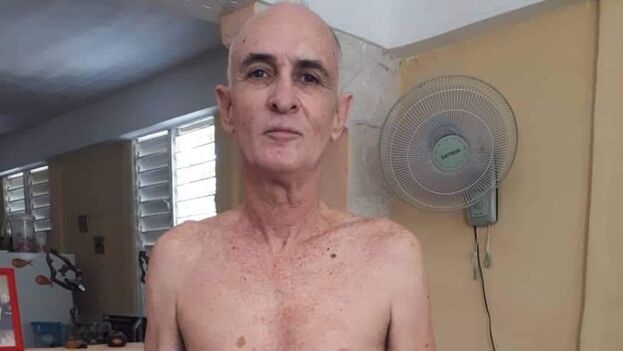
![]() 14ymedio, Havana, 4 September 2020 — Independent journalist Roberto Quiñones was released this Friday after serving his sentence in full, his wife confirmed to 14ymedio.
14ymedio, Havana, 4 September 2020 — Independent journalist Roberto Quiñones was released this Friday after serving his sentence in full, his wife confirmed to 14ymedio.
In statements to Cubanet, Quiñones said that he lost almost 30 pounds during the confinement. “It has been a very difficult year but I do not regret anything I have done,” he said. He also explained that he received several threats from a State Security official who identified himself as Major Sergio, among them that his children could “never again” enter Cuba. “He gave me a video which he said is going to be broadcast on National Television where they try to discredit me as an independent journalist and as a citizen.”
In that video, he is seen to be very morally whole despite his physical condition. “Today I leave the prison much stronger,” he said.
This week, as well, the NGOs Article 19, the Institute for War and Peace Reporting and Amnesty International had launched a campaign to demand the freedom of Quiñones, 63, and this Thursday, the PEN International association published a video in which it joined the petition. This Thursday the Association of Venezuelan Journalists Abroad also participated in this demand.
The reporter, a contributor to Cubanet, was tried and on August 7, 2019, he was sentenced to one year in prison for “resistance” and “disobedience” after reporting the details of the trialof Ramón Rigal and Ayda Expósito — a couple of evangelical pastors who decided to educate their children at home — which was held in April in the Municipal Court of Guantánamo.
According to the journalist, the National Police detained him and beat him, which is why he filed a formal complaint against the police.
An appeals court confirmed his conviction in August 2019, without granting him a new oral hearing and a few days later, on September 11 , he was arrested in Cienfuegos and has remained in prison since then.
During the time he has been serving his sentence, he has suffered gastrointestinal and respiratory problems along with other health complications related to previous pathologies, according to his family, a situation that is complicated by the lurking Covid-19 pandemic.
The journalist has written about his prison conditions, which include overcrowding, the poor quality of water and food, and the lack of adequate medical care, which has led to sanctions from the Disciplinary Council of the Guantanamo municipal prison, which has been forbidden to continue these behaviors.
Since his imprisonment, the United States has demanded the “immediate” release of the journalist.
“We urge the Cuban regime to immediately release Mr. Quiñones and stop the abuse and mistreatment against him,” Secretary of State Mike Pompeo said in a statement last year.
Likewise, the Inter-American Press Association criticized the Government of Cuba and ordered it to suspend the punishment and “not to continue trampling on human rights.”
In prison, Quiñones was awarded the Patmos Prize for Religious Freedom given by the Patmos Institute, which wanted to recognize the Catholic layman because “at a very critical stage for Cuban civil society in general (…) he decided to be an exception and live against the current”.
The Foundation for Human Rights in Cuba recognized Quiñones last August with the General Calixto García Medals and Orders for Freedom, together with Silverio Portal, Lisandra Orraca, the Venezuelan María Corina Machado and the Lithuanian Emanuelis Zingeris.
_____________
COLLABORATE WITH OUR WORK: The 14ymedio team is committed to practicing serious journalism that reflects Cuba’s reality in all its depth. Thank you for joining us on this long journey. We invite you to continue supporting us by becoming a member of 14ymedio now. Together we can continue transforming journalism in Cuba.
